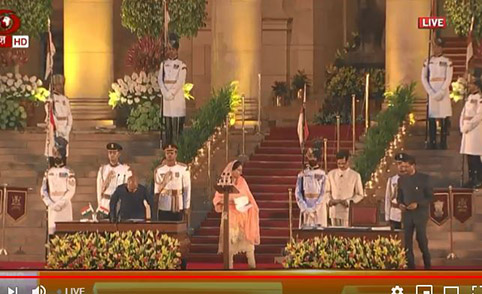Harsimrat Badal takes oath as union minister for second term.
Sardarni Harsimrat Kaur Badal – A Brief Sketch ( Source SAD )
Born in the illustrious Majithia family, Harsimrat did her schooling from Loreto Convent in Delhi and graduated from Delhi University. She pursued textile designing for three years after college. But her heart was aching to do something more fruitful. Soon after getting married to Sukhbir Singh Badal, she opened a school for street children in Vasant Kunj, New Delhi. Harsimrat is also supporting many Old Age Homes including Chaudhary Devi Lal Charitable Old Age Home in Badal besides regularly supporting needy children in need of medical treatment.
Harsimrat is the great grand-daughter of Sardar Attar Singh Majithia who was one of the senior-most Generals of Mahaja Ranjit Singh. In fact, Maharaja Ranjit Singh’s grandfather was married in the Majithia family. The great Attar Singh Majithia attained martyrdom while fighting for the Khalsa Raj battle for the Maharaja. Attar Singh’s son, Sardar Surat Singh Majithia, continued the great tradition of valour and service while being declared by the British as one of the 99 main Sikhs who were opposed to the British rule. He was banished from Majithia and thrown in jail, only to be released after the 1857 mutiny. However, it was Surat Singh’s son, Sardar Sunder Singh Majithia, who is best remembered in contemporary history as the person who contributed the most for the upliftment of the Sikh community and Punjab region as a whole. He brought the Sikhs to the fore-front through the formation of Chief Khalsa Dewan which focussed on education, religion and social issues. He was the prime mover behind the start of many schools, publishing of religious literature & books and newspapers. He also led the movement to put the keeping of Kirpan outside the purview of law and succeeded in this mission on June 25, 1914. Sunder Singh Majithia is also credited with the implementation of Anand Marriage Act in 1909. He was also the first President of SGPC and led the famous Gurdwara Reform movement. Sunder Singh Majithia is best remembered for founding the world famous Khalsa College of Amritsar. During his tenure as Revenue Minister of Punjab, he laid out an extensive system of canals and planned the Bhakra Dam on the river Sutlej and the Thal Dam over the river Chenab now in Pakistan to take water to areas where water was scarce so that the lot of the farmers could be improved.

Sunder Singh’s son, Sardar Surjit Singh Majithia continued the family tradition and served as Squadron leader in Indian Sir Force. Later, he was made Ambassador to Nepal. His services got their due recognition when he was made the Defence Minister of India for 12 years. His contribution in promoting wrestling and cricket by being the President of Indian Wrestling Federation & BCCI are well known. Surjit Singh’s son is Harsimrat’s father, Sardar Satyajit Singh Majithia, who has taken Amritsar’s Khalsa College to new heights. A deeply religious man, he credits all his achievements to the Almighty and is often seen doing community service and Langar Sewa.
Harsimrat has inherited from this rich lineage a value system, for doing selfless service for the welfare of the community, concern for the marginalised groups and poor and spiritual and humane cultural values as opposed to parochial, divisive and fanatic social and political assertions for harmonious living. She has been making tremendous efforts to blend modern skills of doing pro-people work with the knowledge, inspiration and direction acquired from Gurbani.
A proud mother of two daughters, she was deeply pained to see the plight of the Girl Child in Punjab. Her pain actually gave her strength to lead the Nanhi Chhan movement to protect the Girl Child and environment. Started from Sri Darbar Sahib, Amritsar, thousands have joined the Nanhi Chhan movement. Her fight against injustice and her passion for working with marginalised groups such as women, scheduled castes and street kids has motivated her to use electoral and legislative forum for advancing this cause. Harsimrat wishes to use this forum for raising the voice of the downtrodden and marginalised groups. She wishes to fight for increase in the participation of women in work while supporting women’s education and skill development through setting up or supporting institutions, scholarships for girl children for higher studies. She would also want to pressurise both the Punjab as well as Central governments for introducing better schemes for the benefit of Girl Child and marginalised groups in Punjab. Her priority areas would be to arrange better civic amenities, social security schemes and welfare programmes. Education remains a passion for her and she would like to help set up more education institutions for girls in Punjab